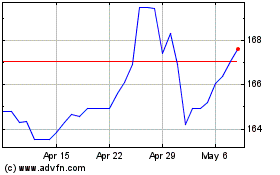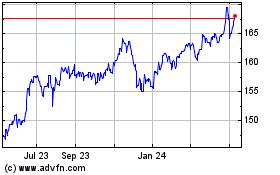Euro Slides As Eurozone Inflation Dips Below 2% Target, Signaling ECB Rate Cut
01 October 2024 - 5:36PM
RTTF2
The euro weakened against other major currencies in the European
session on Tuesday, after Eurozone inflation fell below the 2
percent target for the first time in more than three years in
September, signaling faster interest rate cuts from the European
Central Bank.
The harmonized index of consumer prices posted an annual
increase of 1.8 percent compared to a 2.2 percent rise in August,
flash data from Eurostat showed Tuesday.
Inflation fell below 2 percent for the first time since June
2021. Economists had forecast inflation to moderate to 1.9
percent.
On a monthly basis, the HICP was down 0.1 percent.
Accordingly, the economist expects the ECB to cut its deposit
rate by 25 basis points in October to 3.25 percent.
In June, the ECB had cut its rates for the first time since
2019. After opting for a pause in July, the bank again reduced its
key rates by 25 basis points in September.
According to the CME Group's FedWatch Tool that tracks the
expectations of interest rate traders, the likelihood of a
half-point cut in the next Fed review in November has fallen to 40
percent from 58 percent a week earlier.
A speech by European Central Bank's Vice President Luis de
Guindos along with the U.S. ISM manufacturing PMI and JOLTS job
openings data may garner investor attention as the day
progresses.
In the European trading today, the euro fell to an 8-day low of
1.1084 against the U.S. dollar, from an early high of 1.1145. The
next possible downside target for the euro is seen around the 1.09
region.
Against the pound, the NZ dollar and the Swiss franc, the euro
edged down to 0.8320, 1.7542 and 0.9386 from early highs of 0.8337,
1.7623 and 0.9435, respectively. If the euro extends its downtrend,
it is likely to find support around 0.81 against the pound, 1.74
against the kiwi and 0.92 against the franc.
Moving away from an early 4-day high of 160.91 against the yen,
the euro edged down to 159.30. On the downside, 154.00 is seen as
the next support level for the euro.
Against the Australia and the Canadian dollars, the euro edged
slipped to nearly a 3-month low of 1.6051 and a 5-day low of 1.4994
from early highs of 1.6115 and 1.5072, respectively. The euro may
test support around 1.59 against the aussie and 1.48 against the
loonie.
Looking ahead, manufacturing PMI reports from U.S. and Canada
for September and U.S. construction spending data for August are
slated for release in the New York session.
Euro vs Yen (FX:EURJPY)
Forex Chart
From Oct 2024 to Nov 2024

Euro vs Yen (FX:EURJPY)
Forex Chart
From Nov 2023 to Nov 2024
